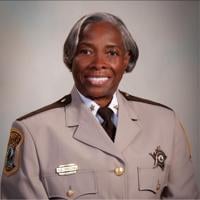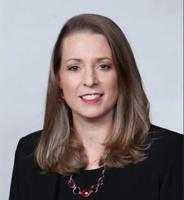It can be really tough trying to convince your nonpolitical friends that politics is interesting. Last week’s election didn’t help.
Sure, voters made history. They sent a strong message to conservative lawmakers about protecting reproductive rights and flipped the House of Delegates. They’re going to give us the first Black speaker of the House and the first transgender state senator in Virginia’s history.
But once the votes were tallied, after tens of millions of dollars, a historic redistricting process and endless chatter of presidential primaries, one chamber went from 22-18 to 21-19 and the other went from 52-48 to 49-51. Not exactly the most riveting political theater.
People are also reading…

Brian Chiglinsky
There was one person, though, who was center stage through it all: Gov. Glenn Youngkin. He and his staff claimed that unified Republican control of the General Assembly would be the hallmark of his political legacy.
It turns out that Virginia voters had other plans. Youngkin’s legacy in Virginia won’t be a political one. As a Democrat, I wasn’t too disappointed in that result. But as someone who once worked for another governor, I found myself with the strange sensation of genuine hope. This could be the opening for Youngkin to step back from the distraction of political warfare and focus on his real legacy in this state — making a lasting, historic change in how Virginians get the mental health care they need.
The last thing the governor probably wants right now is advice from a Democrat. But he doesn’t have to take it from me — he’s already made a down payment. In this latest legislative session, Youngkin along with leaders in the General Assembly unleashed more than $200 million to fix the commonwealth’s broken system of mental health care.
This included more than $58 million for stabilization units and receiving centers, making sure patients have somewhere to go during a mental health crisis that isn’t just the hospital emergency room. It included another $10 million to make sure underserved communities can access mobile crisis services. And to make those services possible, the legislature invested in the staff of community-based behavioral health programs through more than $18 million for recruitment and retention. This is real money that will save lives.
It already is. The commonwealth planned to launch 70 mobile crisis teams by the end of the year. It’s already opened 85. The new 988 crisis hotline is fielding more than 8,000 calls every month. And the number of “temporary detention orders” — basically a measure of the backlog of people needing emergency, involuntary mental health treatment — has dropped by 20% since 2019.

Gov. Glenn Youngkin speaks to reporters on the steps of the Virginia Capitol on Nov. 8, the day after Democrats won control of the House and the Senate.
The governor knows what needs to happen next. He said as much in his first public appearance outside the Capitol Building the morning after the election. “We still have a divided government,” he said, “which means we all have to come together to progress legislation.” He’s right. And without the distraction of presidential primaries and political consultants, the time to make bipartisan progress is right now.
The governor has a number of places to get started. He could:
● Bring together legislative leaders in both chambers and Medicaid’s leadership to enact the recommendations from the experts at the Joint Legislative Audit and Review Commission on how to improve Virginia’s system of community services boards — the primary way that localities get publicly-funded behavioral health care.
● Increase the funding for staff through a second round of resources for community behavioral health treatment. Why not go bold and exceed the Senate’s recommendation?
● Patch the remaining holes in Virginia’s health coverage so every patient in Virginia can afford the care they need. This would mean bringing together leaders in the legislature as well as major insurers across the commonwealth in a historic private-public effort.
The governor said something else revealing when he spoke to reporters on the steps of the Capitol. Tuesday’s election results, he noted, “reflect Virginia’s status as a ‘really purple’ state” where many elections are decided by “‘razor-thin’ margins.”
This is also true. To the endless consternation of Democrats like me and Republicans like Youngkin, Virginia is a deeply purple state. This probably won’t change anytime soon. The ways Virginia runs elections — holding them on off-years from federal elections and limiting governors to only one term — ensure that any so-called political legacy is fragile and fleeting.
But a legacy of truly transforming behavioral health care in Virginia, making a lasting difference in the lives of Virginia’s mental health care professionals and the patients who have struggled in this system over the past few decades, is a legacy worthy of time, energy and money. It’s a legacy any governor — of any party — could be proud of. And Youngkin now has the unique chance to make that legacy a reality.

Hanover County Registrar Teresa Smithson said her short-staffed precincts had to handle an unusually high number of same-day registrations. “It has been very, very busy,” said Smithson. “A really good turnout.”

Two longtime members announced they wouldn’t be returning to the board earlier this year paving the way for new candidates to take over. School Board Roscoe Cooper took an overwhelming number of the votes against two challengers in one of those districts.

The political action committee for the developers of a proposed $562 million South Richmond casino on Tuesday said they accepted defeat after voters for a second time failed to support plans for the entertainment and gaming complex.

All five spots on the Chesterfield County school board were up for grabs during Tuesday’s election.

Three incumbents hold leads over their challengers in Henrico County’s constitutional office races. Two are in strong positions while the third has just a slender lead.

Chesterfield Commonwealth’s Attorney Stacey Davenport is sporting a 52.5% to 46.9% lead over challenger Erin Barr, according to Virginia Department of Elections tallies.

School board members will continue to be appointed, not elected

With Jessica Schneider’s victory over Chris Winslow and Greg Allen in Chesterfield’s Clover Hill District, Democrats now represent the majority of the county’s Board of Supervisors.

Republican challenger Yael Levin spent $56,529 to Prichard’s $8,844, according to the Virginia Public Access Project. But despite the spending disparity, Prichard led Levin by 301 votes — or a mere 5.6% — with five of six precincts reporting as of Wednesday afternoon.
Brian Chiglinsky works in health care communications as the former director of speechwriting at the United States Department of Health and Human Services, with experience in health care startups, as well as local, state and federal government. Contact Chiglinksy at [email protected].